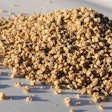Have you heard the one about the ships with ethanol passing in the night? One ship headed north to the U.S. is loaded with Brazilian ethanol made from sugar cane. The other ship headed south to Brazil is loaded with U.S.-produced corn ethanol. Unfortunately, it is no joke but an example of how government’s intervention in economic markets seldom turns out well.
The facts about this trade are not new but surfaced recently in a question to Purdue University’s Dr. Wallace Tyner, who was speaking at the National Chicken Council meeting about EPA’s pending decision concerning a possible waiver of the Renewable Fuel Standard for corn ethanol in 2013.
“The case of the Brazilian-U.S. trade in ethanol is very interesting,” Tyner said. “The U.S. Renewable Fuel Standard has different categories. One of them is 'other advanced,' and includes sugar cane ethanol, which is produced in Brazil. So Brazil lowered its requirement for its domestic use and permitted more sugar cane ethanol to be sent to the U.S. to meet our requirement for other advanced biofuels. The U.S. then started exporting corn ethanol to Brazil to meet that country's domestic demand for ethanol. So we have ships passing in the night on the ocean to accommodate the rules and regulations of our two countries at a cost to consumers in both countries.”
Being in the capitol for the NCC meeting, Tyner couldn’t help spotting the signs put up by the Washington Metropolitan Area Transit Authority promoting corn ethanol. “If you take the Metro here in D.C. you will see signs that say ethanol has reduced the price you pay for gasoline at the pump over $1 per gallon. The study that was used to suggest that was an econometric analysis that has been debunked. It is a flawed study.
“But you don’t need to know about the econometric model to recognize the fallacy. Just think about it. There are 800,000 barrels of U.S. ethanol being produced a day and the global consumption of oil is 89 million barrels of oil per day. The price of gasoline is largely determined by the price of crude oil. There’s no way that 800,000 barrels of ethanol a day compared to 89 million barrels of crude oil a day is going to have a huge impact like that. So the stuff that you may have seen about ethanol causing the price of gasoline to be $1 or more a gallon lower at the pump is just not right,” he said.







